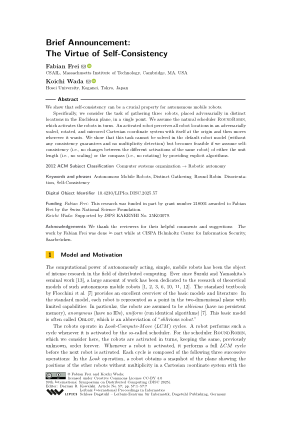Brief Announcement: The Virtue of Self-Consistency
Authors
Fabian Frei  ,
Koichi Wada
,
Koichi Wada 
-
Part of:
Volume:
39th International Symposium on Distributed Computing (DISC 2025)
Part of: Series: Leibniz International Proceedings in Informatics (LIPIcs)
Part of: Conference: International Symposium on Distributed Computing (DISC) - License:
 Creative Commons Attribution 4.0 International license
Creative Commons Attribution 4.0 International license
- Publication Date: 2025-10-22
File

PDF
LIPIcs.DISC.2025.57.pdf
- Filesize: 0.59 MB
- 7 pages
Document Identifiers
Subject Classification
ACM Subject Classification
- Computer systems organization → Robotic autonomy
Keywords
- Autonomous Mobile Robots
- Distinct Gathering
- Round Robin
- Disorientation
- Self-Consistency
Metrics
- Access Statistics
-
Total Accesses (updated on a weekly basis)
0PDF Downloads0Metadata Views
Abstract
We show that self-consistency can be a crucial property for autonomous mobile robots. Specifically, we consider the task of gathering three robots, placed adversarially in distinct locations in the Euclidean plane, in a single point. We assume the natural scheduler RoundRobin, which activates the robots in turns. An activated robot perceives all robot locations in an adversarially scaled, rotated, and mirrored Cartesian coordinate system with itself at the origin and then moves wherever it wants. We show that this task cannot be solved in the default robot model (without any consistency guarantees and no multiplicity detection) but becomes feasible if we assume self-consistency (i.e., no changes between the different activations of the same robot) of either the unit length (i.e., no scaling) or the compass (i.e., no rotating) by providing explicit algorithms.
Cite As Get BibTex
Fabian Frei and Koichi Wada. Brief Announcement: The Virtue of Self-Consistency. In 39th International Symposium on Distributed Computing (DISC 2025). Leibniz International Proceedings in Informatics (LIPIcs), Volume 356, pp. 57:1-57:7, Schloss Dagstuhl – Leibniz-Zentrum für Informatik (2025)
https://doi.org/10.4230/LIPIcs.DISC.2025.57
BibTex
@InProceedings{frei_et_al:LIPIcs.DISC.2025.57,
author = {Frei, Fabian and Wada, Koichi},
title = {{Brief Announcement: The Virtue of Self-Consistency}},
booktitle = {39th International Symposium on Distributed Computing (DISC 2025)},
pages = {57:1--57:7},
series = {Leibniz International Proceedings in Informatics (LIPIcs)},
ISBN = {978-3-95977-402-4},
ISSN = {1868-8969},
year = {2025},
volume = {356},
editor = {Kowalski, Dariusz R.},
publisher = {Schloss Dagstuhl -- Leibniz-Zentrum f{\"u}r Informatik},
address = {Dagstuhl, Germany},
URL = {https://drops.dagstuhl.de/entities/document/10.4230/LIPIcs.DISC.2025.57},
URN = {urn:nbn:de:0030-drops-248737},
doi = {10.4230/LIPIcs.DISC.2025.57},
annote = {Keywords: Autonomous Mobile Robots, Distinct Gathering, Round Robin, Disorientation, Self-Consistency}
}
Author Details
Funding
- Frei, Fabian: This research was funded in part by grant number 218001 awarded to Fabian Frei by the Swiss National Science Foundation.
- Wada, Koichi: Supported by JSPS KAKENHI No. 25K03079.
Acknowledgements
We thank the reviewers for their helpful comments and suggestions. The work by Fabian Frei was done in part while at CISPA Helmholtz Center for Information Security, Saarbrücken.
References
- N. Agmon and D. Peleg. Fault-tolerant gathering algorithms for autonomous mobile robots. SIAM Journal on Computing, 36(1):56-82, 2006. URL: https://doi.org/10.1137/050645221.
-
Z. Bouzid, S. Das, and S. Tixeuil. Gathering of mobile robots tolerating multiple crash faults. In the 33rd Int. Conf. on Distributed Computing Systems, pages 334-346, 2013.

- M. Cieliebak, P. Flocchini, G. Prencipe, and N. Santoro. Distributed computing by mobile robots: Gathering. SIAM Journal on Computing, 41(4):829-879, 2012. URL: https://doi.org/10.1137/100796534.
- Xavier Défago, Maria Gradinariu, Stéphane Messika, and Philippe Raipin Parvédy. Fault-tolerant and self-stabilizing mobile robots gathering. In Shlomi Dolev, editor, Proceedings of the 20th International Symposium on Distributed Computing (DISC 2006), volume 4167 of Lecture Notes in Computer Science, pages 46-60. Springer, 2006. URL: https://doi.org/10.1007/11864219_4.
- Xavier Défago, Maria Potop-Butucaru, and Philippe Raipin Parvédy. Self-stabilizing gathering of mobile robots under crash or Byzantine faults. Distributed Comput., 33(5):393-421, 2020. URL: https://doi.org/10.1007/s00446-019-00359-x.
-
B. Degener, B. Kempkes, T. Langner, F. Meyer auf der Heide, P. Pietrzyk, and R. Wattenhofer. A tight run-time bound for synchronous gathering of autonomous robots with limited visibility. In 23rd ACM SPAA, pages 139-148, 2011.

-
Paola Flocchini, Giuseppe Prencipe, and Nicola Santoro. Distributed Computing by Oblivious Mobile Robots. Synthesis Lectures on Distributed Computing Theory. Morgan and Claypool Publishers, 2012.

- Fabian Frei and Koichi Wada. Brief announcement: Distinct Gathering under Round Robin. Leibniz International Proceedings in Informatics, LIPIcs, 319, 2024. URL: https://doi.org/10.4230/LIPICS.DISC.2024.48.
- Fabian Frei and Koichi Wada. Invited paper: Gathering oblivious robots in the plane. In Toshimitsu Masuzawa, Yoshiaki Katayama, Hirotsugu Kakugawa, Junya Nakamura, and Yonghwan Kim, editors, Stabilization, Safety, and Security of Distributed Systems - 26th International Symposium, SSS 2024, Nagoya, Japan, October 20-22, 2024, Proceedings, volume 14931 of Lecture Notes in Computer Science, pages 39-54. Springer, 2024. URL: https://doi.org/10.1007/978-3-031-74498-3_3.
-
T. Izumi, Z. Bouzid, S. Tixeuil, and K. Wada. Brief announcement: The BG-simulation for Byzantine mobile robots. In 25th DISC, pages 330-331, 2011.

-
S. Kamei, A. Lamani, F. Ooshita, and S. Tixeuil. Asynchronous mobile robot gathering from symmetric configurations without global multiplicity detection. In 18th SIROCCO, pages 150-161, 2011.

- S. Souissi, X. Défago, and M. Yamashita. Using eventually consistent compasses to gather memory-less mobile robots with limited visibility. ACM Transactions on Autonomous and Adaptive Systems, 4(1):1-27, 2009. URL: https://doi.org/10.1145/1462187.1462196.
- Ichiro Suzuki and Masafumi Yamashita. Distributed anonymous mobile robots: Formation of geometric patterns. SIAM J. Comput., 28(4):1347-1363, 1999. URL: https://doi.org/10.1137/S009753979628292X.
- Satoshi Terai, Koichi Wada, and Yoshiaki Katayama. Gathering problems for autonomous mobile robots with lights. Theor. Comput. Sci., 941:241-261, 2023. URL: https://doi.org/10.1016/j.tcs.2022.11.018.
